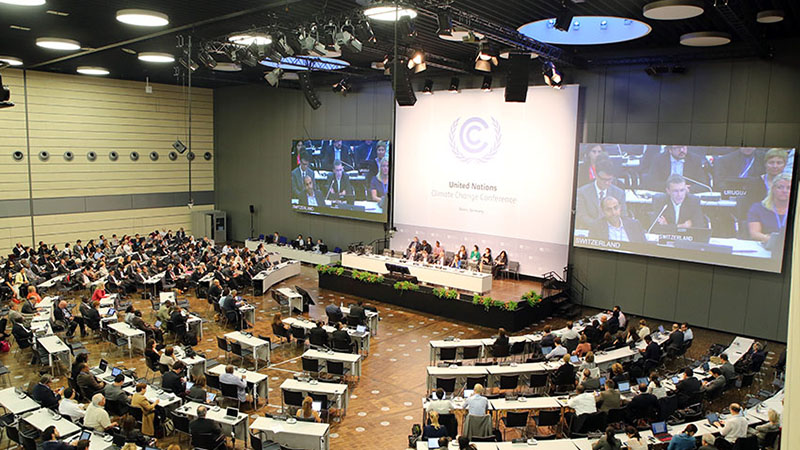It’s time to accelerate the implementation of the Paris Agreement. That’s the cry from UN climate HQ, as two weeks of negotiations get underway in Bonn from Monday.
It’s the first time envoys have come together since the historic pact, and represents a first true test of how strong their will to tackle global warming really is. Top of the list is the creation of a ‘rule book’ that will hold to account the 195 countries that oversaw the deal’s birth last December. “Topics for the rule book include issues such as transparency on the reporting of climate action by nations as part of their Nationally Determined Contributions (NDCs),” says the UN.
Writing for Climate Home, Maldives environment minister Thoriq Ibrahim says he wants to hear more detail on plans to curb greenhouse gas emissions by 2020. Focus on ‘proven solutions’ or run the risk of getting bogged down in the grind of multilateral talks, he writes. “Engineers, business leaders, finance ministers, representatives of civil society” are some of the clean technology expects he wants to hear from in Bonn.
Developing countries have the will to go green, but they lack the capacity, writes Bangladeshi climate expert Saleemul Huq. Bonn is an opportunity for wealthier nations to put this right and give them more access to cleaner technologies such as wind, solar or efficiency plans, and – critically – money.
What do green groups want?
Climate Action Network, a coalition of NGOs, has released its wish-list for the Bonn talks. As follows…
-Progress on Loss and Damage (for climate impacts that cannot be adapted to)
-A roadmap for delivering $100billion per year in climate finance by 2020
-Managing an early implementation of the Paris Agreement
-Work on the ‘global stocktake’ of national plans for climate action (due in 2018)
-Boosting ambition of national climate action plans (INDCs)
-News on national low carbon development plans (due in 2020)
-Development of information requirements and a transparency framework
So long, farewell…
…UN climate chief Christiana Figueres, who leaves her post in July. Her compulsive optimism will be missed by many of her colleagues. And hello, Sarah Baashan (Saudi Arabia) and Ms. Jo Tyndall (New Zealand), presumptive chairs of the UN talks through 2016.
UNFCCC Secretariat receives nominations for #APA1 Co-Chairs https://t.co/7x91LiKGxh #ParisAgreement #SB44 pic.twitter.com/lnnCFYiofm
— UN Climate Change (@UNFCCC) May 15, 2016
Early entry?
That’s the likely call from G7 environment ministers at their meeting in Toyama, Japan. A draft communique leaked Friday. Carbon pricing and emissions trading were both noted as means G7 countries would seek to meet their commitments. “We affirm the importance of early entry into force and balanced implementation of the Agreement, with the participation of all Parties,” added te draft.
Rising tides
“More than a billion people are set to be exposed to coastal flooding by 2060 through a combination of sea level rise, storm surges and extreme weather” – the view there of Christian Aid. Together with other Christian NGOs it has released a report that warns Calcutta, Mumbai, Guangzhou and Miami are among cities at risk from coastal flooding and extreme weather events.
“Miami is also forecast to suffer the brunt of the financial losses from coastal flooding by 2070, topping a separate list with an eye-watering $3.5 trillion of exposed assets. The USA is likely to pay a hefty price for its world-leading per capita carbon emissions, as New York also comes in third with $2.1 trillion,” says the study.
Trump’s not biting
Two days after Donald’s new climate advisor told ClimateWire he might consider a carbon pricing system of some sort (he kept it pretty vague) we have this. Pretty conclusive from the man who thinks China made up climate change to punish the US.
.@thehill Your story about me & the carbon tax is absolutely incorrect—it is just the opposite. I will not support or endorse a carbon tax!
— Donald J. Trump (@realDonaldTrump) May 13, 2016
Big oil slashes R&D
Falling oil prices are biting. BP slashed its R&D budget 41% over 2013-2015, above an industry average of 15-20%, reports the FT. The news comes a week after new data suggested US oil rig counts have collapsed as profits dry up.
Norway oil fund sues VW
The lawyers will be rubbing their mitts. Fresh from announcing it’s divesting from coal, Norway’s $850 billion oil fund is suing VW over the diesel emissions scandal that rocked the company last year. In recent years the oil fund has said it wants to be a more responsible investor.
Petter Johnsen, chief investment officer at Norges Bank Investment Management, which manages the fund told the FT: “As an investor it is our responsibility to safeguard the fund’s holding in Volkswagen.”
When is a road not a road?
When Ecuador’s government says it does not exist. Quito’s attempt to get rich nations to pay it to keep its oil reserves in the ground failed, so it’s now drilling. But woe-betide anyone who says the Amazon is suffering as a result, as German film-maker Nina Bagalke discovered.
